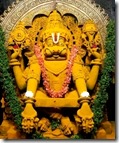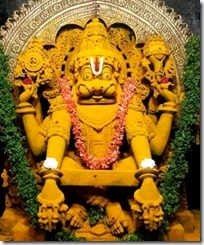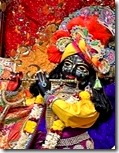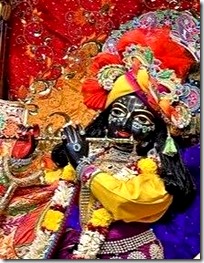 "Unless they smear upon their bodies the dust of the lotus feet of a Vaishnava completely freed from material contamination, persons very much inclined toward materialistic life cannot be attached to the lotus feet of the Lord, who is glorified for His uncommon activities. Only by becoming Krishna conscious and taking shelter at the lotus feet of the Lord in this way can one be freed from material contamination." (Prahlada Maharaja, Shrimad Bhagavatam, 7.5.32)
"Unless they smear upon their bodies the dust of the lotus feet of a Vaishnava completely freed from material contamination, persons very much inclined toward materialistic life cannot be attached to the lotus feet of the Lord, who is glorified for His uncommon activities. Only by becoming Krishna conscious and taking shelter at the lotus feet of the Lord in this way can one be freed from material contamination." (Prahlada Maharaja, Shrimad Bhagavatam, 7.5.32)
Download this episode (right click and save)
नैषां मतिस् तावद् उरुक्रमाङ्घ्रिं
स्पृशत्य् अनर्थापगमो यद्-अर्थः
महीयसां पाद-रजो-’भिषेकं
निष्किञ्चनानां न वृणीत यावत्
naiṣāṁ matis tāvad urukramāṅghriṁ
spṛśaty anarthāpagamo yad-arthaḥ
mahīyasāṁ pāda-rajo-’bhiṣekaṁ
niṣkiñcanānāṁ na vṛṇīta yāvat
The creation attributed to Him should be enough. To have a massive object that floats in space and produces endless heat and light is itself uncommon. To configure an engine of earth, water and air delivery, with predictable and reliable movements, should be sufficient cause for glorification.
Yet to see the association is difficult in the conditioned state. Therefore the doubting souls insist on hard evidence. They need to see something to prove the existence of God. They also want justification for the recommended practice of glorification.
Prahlada Maharaja says that the Supreme Lord, whose many names include Vishnu, is glorified for His uncommon activities, urukramanghrim. Vedic literature provides ample supporting evidence.
1. Killing Putana
Here Vishnu was on earth in the two-handed form of Shri Krishna. The darling of Vrindavana as a youth, everyone was captivated by Yashoda’s son. He, in fact, first appeared from the womb of mother Devaki in Mathura. Due to the danger posed by the leader, Kamsa, the birth-father, Vasudeva, transferred the newborn Krishna to Gokula Vrindavana, where He would likely be in safe hands under the care of Nanda and his wife Yashoda.
Kamsa later learned of Krishna’s birth and wanted to do something about it. He deputed a witch named Putana to go and kill Him. Kamsa did not realize that Vishnu’s potency is the same irrespective of the visual. Krishna could do anything as an infant, though appearing to be helpless and fully dependent on the elders.
Putana had the ability to change her shape at will. From reading Vedic literature we find that this is not an uncommon ability. Today the same feat exhibited in public might fool millions of people into accepting you as God, but in reality there is only a shift in material elements occurring. Through a little mystic power even a person if ill-intent can do the same.
Putana arrived in Gokula dressed as a beautiful, enchanting woman. This made it easier to pick up baby Krishna to nurse Him. No one objected. She had smeared poison on the breast. This would be a rather straightforward strike.
 Not only did Krishna survive, but He ended up sucking the life out of her. The magic of the mystic ability vanished at the same time. Putana reassumed her large and hideous form. She crashed to the ground in death. Meanwhile, Krishna innocently played on her body. He was not hurt in the least.
Not only did Krishna survive, but He ended up sucking the life out of her. The magic of the mystic ability vanished at the same time. Putana reassumed her large and hideous form. She crashed to the ground in death. Meanwhile, Krishna innocently played on her body. He was not hurt in the least.
2. Tolerating Bhrigu
Imagine you are lying down in rest. Your wife is massaging your feet. Suddenly, you feel a sharp blow to the chest. Upon opening your eyes you see that someone you know very well has kicked you. There was no justification. They were simply conducting a test, to see if you got angry as a result.
This happened to Vishnu once. The one of uncommon activities showed tolerance to the highest degree. He asked if the brahmana Bhrigu had hurt his foot, since Vishnu’s chest is known to be hard. He welcomed the guest as if he had done nothing wrong. This was a devotee, after all, and he wouldn’t have been allowed in Vaikuntha if he lacked the qualification of gentleness, tolerance, intelligence and allegiance to the Supreme Lord and those who support Him.
3. Appearing from a pillar
Prahlada already knew that Vishnu is amazing. He didn’t require further convincing. The asura class, however, would not take his word for it. Prahlada was a young child at the time, and a stubborn one at that. He refused to take an interest in statecraft, at a time when the orders directly from the crown demanded otherwise.
The father Hiranyakashipu eventually became fed up. He mocked Prahlada’s devotion. If God were indeed everywhere, as the boy claimed, then why wasn’t He in the nearby pillar? Vishnu most certainly was, and He soon appeared from the column, to the father’s dismay.
 This was an awe-inspiring vision. An angry half-man/half-lion, ready to pounce on the offending father, who had tried to kill Prahlada as punishment for devotion. The uncommon form took the uncommon step of killing the true offender through the means of bifurcation. God indeed was in the pillar, and His full strength was also present in the nails on the hands.
This was an awe-inspiring vision. An angry half-man/half-lion, ready to pounce on the offending father, who had tried to kill Prahlada as punishment for devotion. The uncommon form took the uncommon step of killing the true offender through the means of bifurcation. God indeed was in the pillar, and His full strength was also present in the nails on the hands.
In Closing:
Through feats not routinely shown,
As one of uncommon activities known.
Such as from Putana witch feeding,
And Bhrigu’s chest kick proceeding.
For Prahlada from column appearing,
And obstacles to devotion clearing.
Justification for praise a sample,
Vedas with evidence ample.

 “The Vedas prescribe two different types of occupation for the human being. One is called the pravritti-marga, or the path of sense enjoyment, and the other is called the nivritti-marga, or the path of renunciation. The path of enjoyment is inferior, and the path of sacrifice for the supreme cause is superior.” (Shrila Prabhupada, Shrimad Bhagavatam, 1.2.6 Purport)
“The Vedas prescribe two different types of occupation for the human being. One is called the pravritti-marga, or the path of sense enjoyment, and the other is called the nivritti-marga, or the path of renunciation. The path of enjoyment is inferior, and the path of sacrifice for the supreme cause is superior.” (Shrila Prabhupada, Shrimad Bhagavatam, 1.2.6 Purport) Recently you went overseas for a vacation. As the coverage area was limited, regular browsing of the internet could not take place. At the same time, you didn’t feel the need. You were more relaxed. No envy. No getting upset over trivial issues, things that had no material value. It was like the previous experience was entirely in illusion.
Recently you went overseas for a vacation. As the coverage area was limited, regular browsing of the internet could not take place. At the same time, you didn’t feel the need. You were more relaxed. No envy. No getting upset over trivial issues, things that had no material value. It was like the previous experience was entirely in illusion.  The difference is that bhakti-yoga is connecting directly with Bhagavan. The indirect connection is through the illusory energy of maya, which brings so many miserable conditions that are unnecessary. Paired with vairagya is asakti for Krishna. Detachment for attachment’s sake. Those who are attached to Him can know Him free of doubts.
The difference is that bhakti-yoga is connecting directly with Bhagavan. The indirect connection is through the illusory energy of maya, which brings so many miserable conditions that are unnecessary. Paired with vairagya is asakti for Krishna. Detachment for attachment’s sake. Those who are attached to Him can know Him free of doubts. ![[Narasimhadeva] [Narasimhadeva]](https://blogger.googleusercontent.com/img/b/R29vZ2xl/AVvXsEgRwcVLDeViuhbTFGb_pGdxJYmP5BagdyXu44Zga7Wnuocc7gsGX5Cn7GZKVhZ8DZhPkIChGTB9rwpF-0VhclQPsiA3fOPHmkp8ZkRmk7bNiEKEo_w1fX3p7WH-_sJnoHxAw7fIjdDxXLxE/?imgmax=800) “Becoming Krishna conscious brings about anartha-apagamah, the disappearance of all anarthas, the miserable conditions we have unnecessarily accepted. The material body is the basic principle of these unwanted miserable conditions. The entire Vedic civilization is meant to relieve one from these unwanted miseries, but persons bound by the laws of nature do not know the destination of life.” (Shrila Prabhupada, Shrimad Bhagavatam, 7.5.32 Purport)
“Becoming Krishna conscious brings about anartha-apagamah, the disappearance of all anarthas, the miserable conditions we have unnecessarily accepted. The material body is the basic principle of these unwanted miserable conditions. The entire Vedic civilization is meant to relieve one from these unwanted miseries, but persons bound by the laws of nature do not know the destination of life.” (Shrila Prabhupada, Shrimad Bhagavatam, 7.5.32 Purport)![[subway sign] [subway sign]](https://blogger.googleusercontent.com/img/b/R29vZ2xl/AVvXsEimnf3SDXJSm1FTNOMGjcynlOsuHA4f8MPnvzUUPFvDjocXP7ZRRNFY2nNhncQT-o5HvRj90NXTdIUn6uRcsr-jT8MEpyhkKIac8Ay7OUcrojQ4BNfO2xRWVil_uKe7S6IC5ldekgpVS8c/?imgmax=800) Friend2: The thing is, if every person exiting the train travels only in one direction, you might not know there is another option.
Friend2: The thing is, if every person exiting the train travels only in one direction, you might not know there is another option.  Friend2: They didn’t accept Prahlada as their saintly guide, but there was still a benefit through his association. That amazing child caused the appearance of
Friend2: They didn’t accept Prahlada as their saintly guide, but there was still a benefit through his association. That amazing child caused the appearance of ![[Shri Krishna] [Shri Krishna]](https://blogger.googleusercontent.com/img/b/R29vZ2xl/AVvXsEjro1-WjzVM5zaBCKxhkWt5U55EgjgfnyTYMdEZjFE9ZjMwctZuRRv0nX8VUyPpiSXJMZGO5ywx11LOlAXveVt925K5FI88yejuEH1ZF5qMax9sAPUVNYfd2FlPa2miNot-z3DZ37-ZWho/?imgmax=800) “Hereditary gurus, or spiritual masters, have been accepted everywhere since time immemorial, but Prahlada Maharaja declined to accept such a seminal guru or take instruction from him. An actual guru is shrotriya, one who has heard or received perfect knowledge through parampara, the disciplic succession.” (Shrila Prabhupada, 7.5.31 Purport)
“Hereditary gurus, or spiritual masters, have been accepted everywhere since time immemorial, but Prahlada Maharaja declined to accept such a seminal guru or take instruction from him. An actual guru is shrotriya, one who has heard or received perfect knowledge through parampara, the disciplic succession.” (Shrila Prabhupada, 7.5.31 Purport)![[Family_doctor] [Family_doctor]](https://blogger.googleusercontent.com/img/b/R29vZ2xl/AVvXsEjGyKhx-GKdmM5MBOv_zguHgeKwybyR6ljN8K-3K83eR-q9XpxYA-a5n9pKXI_wgQtxX1sQ_wXH1kK4mREPnU7hBBQPRmOOoYf0eNG9DiMWzFPw7gZ_i7y2X9ND6-YqT8ie7fkBTWuI4VI/?imgmax=800) This teacher is very easy to accept, since there is no requirement to search. They likely won’t reject disciples new to appear within a family. In the
This teacher is very easy to accept, since there is no requirement to search. They likely won’t reject disciples new to appear within a family. In the  Narada Muni was the accepted guru, who happened to give his association even before Prahlada was born. This is the best person to influence a belief system since they will show the path towards the actual truth, tattva. Their word is based on the highest authority, Shri Krishna, who is at the origin of any bona fide chain of disciplic succession.
Narada Muni was the accepted guru, who happened to give his association even before Prahlada was born. This is the best person to influence a belief system since they will show the path towards the actual truth, tattva. Their word is based on the highest authority, Shri Krishna, who is at the origin of any bona fide chain of disciplic succession. ![[Sudama_Krishna] [Sudama_Krishna]](https://blogger.googleusercontent.com/img/b/R29vZ2xl/AVvXsEiYDbPdVEQDDAYCbRF50B43OEJMre-MDoErzJUMSVckzjdWF3lfripmPb79elryAgaDy5tmqSEwoBvizSgMZQQdEvEo2GAlPyVaIoZFzp1LSJGDDZYKFa6IEkOw61-TqEeB8m9DtR3och4/?imgmax=800) “The brahmana thought that there was no need to ask any material benefit from Lord Shri Krishna, but he was induced by the repeated requests of his wife. Moreover, he thought, ‘If I go there I shall be able to see the Lord personally. That will be a great opportunity, even if I don't ask any material benefit from Him.’” (Krishna, The Supreme Personality of Godhead, Vol 2, Ch 25)
“The brahmana thought that there was no need to ask any material benefit from Lord Shri Krishna, but he was induced by the repeated requests of his wife. Moreover, he thought, ‘If I go there I shall be able to see the Lord personally. That will be a great opportunity, even if I don't ask any material benefit from Him.’” (Krishna, The Supreme Personality of Godhead, Vol 2, Ch 25)![[Dvaraka_temple] [Dvaraka_temple]](https://blogger.googleusercontent.com/img/b/R29vZ2xl/AVvXsEio7_hmoLzLLniMi4W5RmwM4BmwdhPmZigfQ2d78gLloBMT-xklUsAJiNvE652UmXzANwTtz_HeIpMxs5-5fzxmUbikYwsk0D9oLHn1bbW2ZpzY9OvivG7hyphenhyphencJTuqECUNscHKU8hmrOEvE/?imgmax=800) Friend2: That was the original purpose of the visit. It’s sad but that’s how friendship works most of the time. People want something. They call you after a long time because they need help or a favor. You may not see them for a while after that.
Friend2: That was the original purpose of the visit. It’s sad but that’s how friendship works most of the time. People want something. They call you after a long time because they need help or a favor. You may not see them for a while after that. ![[Sudama_Krishna] [Sudama_Krishna]](https://blogger.googleusercontent.com/img/b/R29vZ2xl/AVvXsEh9PHSjyxyIZfdjz2v26ML3LyUvjSTDhNU0kifE6UdW8S8tWsS_TbRCrjVIHoY8hygIcB05kY96cNfZfnRNzerPdfDCrbQUDwF9etPFqiADz4CSDjcUNsOyayKUOeg7PzeMhqO4yMONjrdE/?imgmax=800) Friend2: She gets the credit for the entire exchange. Her association should be considered auspicious, something that only increased the devotion to Krishna in her husband.
Friend2: She gets the credit for the entire exchange. Her association should be considered auspicious, something that only increased the devotion to Krishna in her husband. ![[Krishna's lotus feet] [Krishna's lotus feet]](https://blogger.googleusercontent.com/img/b/R29vZ2xl/AVvXsEj2XDC6vrYLMBRWKeM7UeYL3opVQZ2RQMnrgPeUgZqbYd1scklMoxUqsRmJ4s7dkMZg2CGOVKaJH74lYyn0tjvjQgB6ev_BkotUIc_Rjuppw4kvDY90mjtP5LQv8bngwijiXsGtzo2h11Q/?imgmax=800) “The son of Shukracharya, Hiranyakashipu's spiritual master, said: O enemy of King Indra, O King! Whatever your son Prahlada has said was not taught to him by me or anyone else. His spontaneous devotional service has naturally developed in him. Therefore, please give up your anger and do not unnecessarily accuse us. It is not good to insult a brahmana in this way.” (Shrimad Bhagavatam, 7.5.28)
“The son of Shukracharya, Hiranyakashipu's spiritual master, said: O enemy of King Indra, O King! Whatever your son Prahlada has said was not taught to him by me or anyone else. His spontaneous devotional service has naturally developed in him. Therefore, please give up your anger and do not unnecessarily accuse us. It is not good to insult a brahmana in this way.” (Shrimad Bhagavatam, 7.5.28)![[windows_clustering] [windows_clustering]](https://blogger.googleusercontent.com/img/b/R29vZ2xl/AVvXsEgSPVZuPUYsfc0bpyX9XsVFWoxuHAYEelFxgxLkramz-El0halPSeePG-EOLNyQ3DobxdnNctkzt-GBdnXhfFgE65VqzaAJ0wCFIhK9XrDWAzYwYXufQKUQiU5cCItYGyf-MTLLj_Mk9guX/?imgmax=800) Hiranyakashipu had to pay attention to this issue precisely because there was reason for many people to come after him. He had forced his way into the post of ruler of the world. This involves the use of physical force, or at least the threat of it.
Hiranyakashipu had to pay attention to this issue precisely because there was reason for many people to come after him. He had forced his way into the post of ruler of the world. This involves the use of physical force, or at least the threat of it. ![[Krishna's lotus feet] [Krishna's lotus feet]](https://blogger.googleusercontent.com/img/b/R29vZ2xl/AVvXsEjipEwyvYue4aJ0s15LT1vA7NZbcaUPnnasy9DaIppoPndBxbcCxe1NkB-jP0vr5xNiuQEPU94PnJL8fUjn1J9ko7xf0N32FfuHCnDxkMbeWL4vWqbgA-hUZoJP2vrS1z7Ye1Oz5fOQ9yg/?imgmax=800) The incident highlights the potency of transcendental sound. It can penetrate any area and have a lasting effect, even in someone born in the Daitya dynasty. The demons had a devotee in their midst, and they didn’t know what to do about it.
The incident highlights the potency of transcendental sound. It can penetrate any area and have a lasting effect, even in someone born in the Daitya dynasty. The demons had a devotee in their midst, and they didn’t know what to do about it.